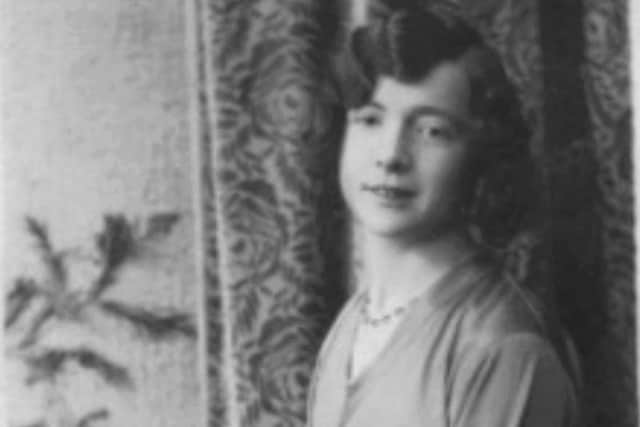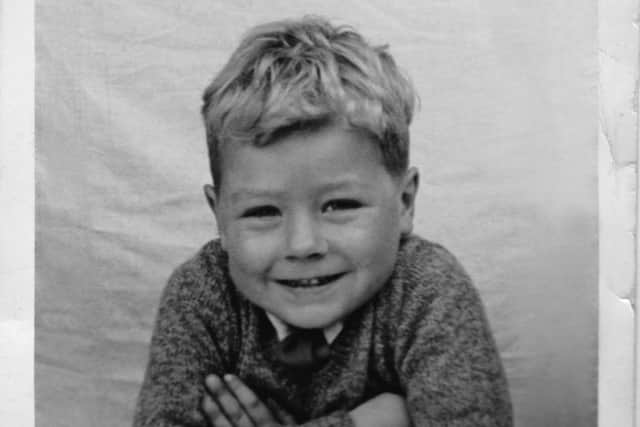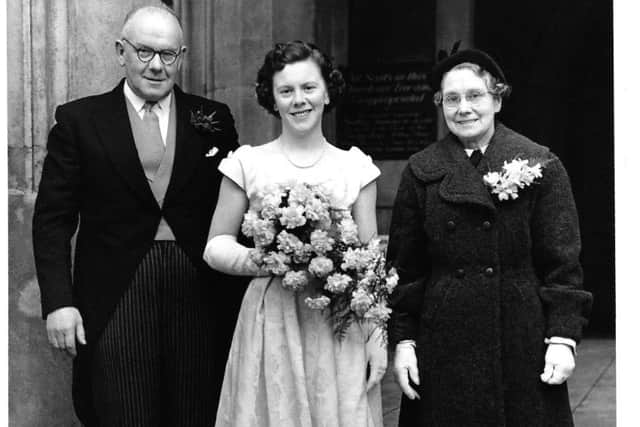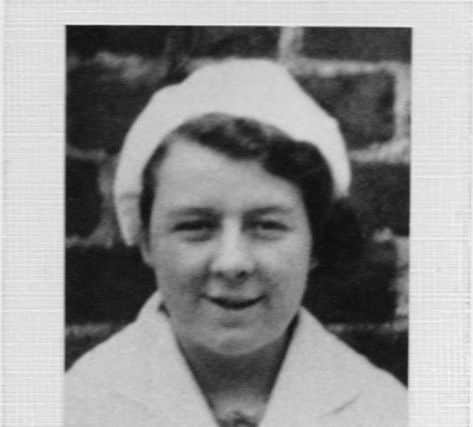Interview: Comedian Gregor Fisher untangles his past


Gregor Fisher has been left alone in a meeting room at Scotland on Sunday for less than five minutes while I sort out cups of tea. On my return he’s up at an easel that’s been left out, markers in hand, gleefully drawing a big clown’s face on a sheet of A3. A curly coil of hair, red crosses for eyes, red nose…
“Needs a big red mouth,” he says, and squiggles it in. “There.”
“I bet you were bad at school,” I say.


Advertisement
Hide AdAdvertisement
Hide Ad“Who me?” he replies, all innocence. He’d probably try “It wisnae me,” but he’s been caught red-marker-pen-handed. “Well, I was probably a bit lippy,” he concedes.
At first glance, Fisher, 61, appears calm and quite serious-looking, warm and pleasant, smiley-eyed, and if you’d said he was the architect he wished he’d stayed at school to become, you wouldn’t be surprised. Blue quilted jacket, smart blue and white striped Ralph Lauren shirt, navy chinos, shiny black shoes, he has an air of comfortable respectability. This begins to slip, however, as the photo shoot gets under way and he messes around on a revolving, propelling stool. Sadly the chair holds firm and we’re denied a reprise of his Baldy Man Hamlet cigar advert.
Then it’s off to the interview room along a corridor lined with cartoons by Glaswegian artist Emilio Coia, where the actor ticks off his fellow thespians. “Coias! Amazing. There’s Peter Ustinov, Albert Finney, Alastair Sim,” and it’s then that we pass a glass-walled office where a meeting is taking place. Around the table the expressions are serious and intense. No-one notices the Rab C Nesbitt star, one of the country’s most popular comic actors, mugging and fooling around not six feet away through the glass. Fair enough, he’s not in his string vest, pinstriped jacket and dirty bandage bandana combo, but still.
“Look at them. Very serious. Not many laughs in there,” he says as if he’d like nothing better than to break in and crack them up. Fisher is a big believer in laughter. “It’s good to laugh. Even in the most hellish of circumstances. If you’re able to get a laugh, you can defuse situations. I always liked laughing as a child. It makes you feel better.”


Fisher’s very early life wasn’t short on hellish circumstances: he was orphaned, adopted, then passed on, but his sense of fun flourished, thanks not least to Cis, the woman he came to call mother. She scooped him up when he needed it and fed, clothed and loved the little boy with the winning smile. It’s the same smile that grins out of his new memoir, The Boy From Nowhere, written with journalist Melanie Reid. Their attempt to track down the truth about Fisher’s origins took them on a year-long road trip all over Scotland.
“Less Johnson and Boswell, more Dastardly and Muttley,” Fisher jokes. He knew he was adopted but it was only when a mutual friend brought him and Reid together that the book became a reality and he decided to find out what happened to his mother. “My birth mother,” he clarifies. “There are a lot of mothers in this book. My birth mother, Kit McKenzie, my adopted mother, Ellie Fisher, and then Cis, my mum. I also wanted to find out the story of my father, William Blake Kerr.”
In spring 2014, the pair took the scant facts Gregor had gleaned over the years, and ran with them. Or rather drove around Scotland in Reid’s silver VW Polo. It was Reid who also did a brilliant job of giving a sense of place and time for a generation who are strangers to a world of shotgun weddings, outside lavvies, no NHS and the stain of illegitimacy.
“My life’s a bit like a big jumble of spaghetti and I was trying to untangle it,” he says. So what was the story of Kit McKenzie and William Blake Kerr?


Advertisement
Hide AdAdvertisement
Hide Ad“It was alien territory for me to talk about such things because I’m a product of 1950s Scotland and not touchy-feely. I’m quite private. Not about my strange beginnings, because I always think if I talk about that some kid who might be in a bit of a funny position might see it and think, ‘Ach well, he had a kind of strange start and seems to be all right.’ So I feel duty bound to talk about that,” he says.
“I think I always wanted to pin it down, but I was too busy enjoying my family, living my life and everything was OK. I was always of the impression that if it ain’t broke, why try to fix it?”
He was also reluctant to delve into his past while the woman he calls mum, Cis, was alive. She died in 1984.
“I found no need to even hint that I was malcontent with my position and looking for a birth mother. I wouldn’t have done that,” he says.


Fisher was born on 22 December, 1953, in the village of Menstrie, near Stirling, one of three illegitimate children to Kit McKenzie. She had a heart complaint, became ill and died at 38, when Gregor was two-and-a-half, and against her wishes, he and his two sisters were split up. After a spell in children’s homes, Gregor was adopted by Jim and Ellen Fisher, and when Ellen died shortly after, he was taken by Jim’s sister Cis to live with her family in Neilston, near Barrhead.
“Yes, folks, it’s a comedy!” says Fisher.
It’s testament to Reid and Fisher that the story is in fact full of warmth and laughter, despite the harsh lives and sadness that befalls some of the main characters.
Fisher first got wind that he was adopted when he was 14, after stopping the teatime conversation by asking where he was christened. Later Cis knocked on his bedroom door and told him. “You’re adopted. We look after you now, you know. We wanted you. We love you.” Then she patted him on the head. Twice. As Fisher writes, “A single pat was unheard of. Two was a sign of almost uncontrollably high emotion.”
He assumed he was the child of his uncle, Jim Fisher. People said he looked like him, and nothing more was said.
Advertisement
Hide AdAdvertisement
Hide Ad“I was happy, warm, fed, loved. I didn’t want to look into it because I didn’t think my mum would care for it very much. She was a West of Scotland private little buddy.”


At 18, Fisher got a letter from his sister Maureen, someone he had never known existed, suggesting they meet. “So we did, outside the lost property office at Central Station in Glasgow. Honestly, there are things in this book that people must think, ‘Naw, yer makin’ that up!’ But that’s what we did.”
Maureen filled in some of the blanks, that his mother had died, they had another sister, and he’d been adopted when he was two-and-a-half. That was it for the moment.
“What makes a brother and sister is time, and one of the sadnesses is that lost time, but we’ve made up for it since,” he says.
In the 1980s they were given their father’s name and little else by their mother’s estranged sister, Ruby, and in the 1990s they received a picture of him from a distant relative they’d tracked down. William Blake Kerr had a legitimate family too and was married when he had the affair with Kit. Then one rainy day in 2006, Gregor and Maureen filled in a family tree and decided to get in touch with their half-brother John.
“I said, ‘This guy’s getting on. We need to get a move on.’ Writing that letter to John Kerr was one of the finest things I have ever done in my life. Because he was a genuinely engaging, kind human being. He was a journalist at the BBC and theatre critic so we had a lot in common, and also I found out things I would never have found out, about my father’s personality, the way he was brought up. John welcomed us into his family.”
But Fisher’s birth mother Kit still proved elusive.
“This woman was erased,” he says, slamming his hand on the table. “She had overstepped the line, not played by the rules, disobeyed the morals of her time. That was a terrible thing to do in the 1950s and she would have been punished for that. It would have taken quite some doing to push a pram up through an industrial village at the foot of the Ochils, with three children, each of them illegitimate. Bastards! That’s quite a strong woman that can do that.”
Finally, this summer Fisher and Reid solved the mystery and the hunt is over. The book explains it better than I ever could, so no spoilers here. Does Fisher feel he’s got to the end of the story?
Advertisement
Hide AdAdvertisement
Hide Ad“The end is never the end. You get to know those people lived, had children, died, but the bits in between you don’t. I don’t know what this guy’s relationship with my mother was about. I don’t know whether it was the love affair of the century or whether it was a convenience.”
I tell him I don’t think it was a convenience, because there was more than one child.
“It’s an interesting thing,” he says, “that all the females I talk to, and I’m not being a smartarse here, say what you’ve said. And the males say [he adopts a dismissive tone], ‘Aye well, it could have been. Is it what you want it to be, or is it what it really was?’ And the truth of that is we don’t know.”
Fisher wasn’t engaged by the education on offer at Barrhead High School, but a turning point came when a teacher told him he was playing the part of Pooh-Bah in The Mikado. His reaction, “Why me sir? Ah havnae done anything,” fell on deaf ears.
“At my school if you were involved in amateur dramatics you were in need of psychiatric help or of dubious sexuality. But they made me, and at least it got me out of classes for rehearsals.”
Fisher’s first foray into drama was a roaring success and when he left school at 16 with a single O Level in art and embroidery he also had a pamphlet about the Royal Scottish Academy of Music and Drama. When a series of jobs in an Elastoplast factory, a lavatory manufacturer and a dye factory didn’t do it for him, at 18, he applied to RSAMD – now the Royal Conservatoire of Scotland – and got in.
Halfway through his third year he found a job at Dundee Rep, and with it a prized equity card. Chekhov, Shakespeare, Ibsen and Pinter followed before he joined the Royal Lyceum in Edinburgh in 1977. There he met Rikki Fulton, who told him he’d be great in a show he was doing for BBC Scotland, Scotch And Wry. Fisher’s TV career was born. BBC Radio Scotland’s Naked Radio, a weekly satire of topical events followed, and moved to TV as Naked Video in 1985. His TV credits include The Tales Of Para Handy, Kidnapped, Gormenghast and Oliver Twist, while on film Fisher appeared alongside Al Pacino in the The Merchant Of Venice, John Hurt in Nineteen Eighty-Four and Bill Nighy in Love Actually.
“What really gets you going is when you’ve got a bit of writing where you read the script and you think, ‘What did the writer mean?’ and you’re trying to give it flesh, feel the heartbeat, get it up and running.”
Advertisement
Hide AdAdvertisement
Hide AdBy now it’s clear that Fisher is a million miles from Rab C Nesbitt, the role for which he is best known and which has made Scotland laugh from its inception in 1988, through 67 episodes and right up to last year’s DVD, Rab In Hoodie.
At first Fisher was lukewarm about the character that was to go on to be one of Scotland’s most popular, the park bench philosopher, lowlife scum, and proud of it.
“Ian Pattison created a fabulous character,” he says. “It just took me a long time to realise it. I thought, ‘Here we go, let’s bash the West of Scotland, a lot of drunks and ne’er-do-wells…’ And I didn’t think it was particularly funny. Simple. But Colin Gilbert [the producer] said, ‘I think it’s funny, I’m paying your wages, let’s do it.’ So I said OK.
“I was a little Scottish actor who had dreams of maybe going to the RSC or being a ‘proper’ thespian, you know. I wanted to have as broad a career as possible and it didn’t figure in my plans that I should be playing Scottish people all the time.”
Yet since then Fisher’s range has gone well beyond Rab C. He was recently back on stage for the first time in 25 years for the Scottish National Theatre’s acclaimed Yer Granny. He has also just completed filming, Whisky Galore, based on the Compton Mackenzie tale immortalised in the 1949 Ealing comedy about islanders rescuing 30,000 cases of Scotch from a shipwreck and due for release next year. Fisher plays Joseph Macroon, who runs the post office and most other things on the island.
“Whisky Galore is undeniably one of the best jobs I’ve had in my 40 years in the business,” he says. “Gillies MacKinnon, the director, is top drawer. We had big Jimmy Cosmo, Eddie Izzard, Brian Pettifer and a terrific young actor called Kevin Guthrie [Sunset Song and Sunshine On Leith] who’s first class and comes from my home town of Neilston. It was a great cast and filming in Banffshire was a delight from start to finish. I don’t mind telling you I was slightly moist when it all came to an end,” he says.
Did the whisky flow on or off set at all?
“No, it was all coloured watter. There maybe were a couple of drams taken of an evening, but I’m not a huge whisky drinker. I’m not a huge drinker. I can’t do it the way I did, so I just don’t any more.”
Theatre also introduced Fisher to his wife, Victoria Burton, when they both played in Dundee Rep’s Midsummer Night’s Dream. He was Bottom to her Helena. For several years after, she was oblivious to his feelings, but Fisher knew it was meant to be.
Advertisement
Hide AdAdvertisement
Hide Ad“This is one of the other things people think I’m making up, but it was just a given that we would be together. An inevitability. As sure as you had to take your next breath, that was it. It was otherworldly, sounds a bit wanky, but that was the way it was. It just had to be and it was going to be. Even though she went one way, I went the other and years went past, I knew it would be fine. It was just a matter of time. I would spend the rest of my life with that woman.” A few years on, back in London, the pair mixed in the same circles, and went on to have three children, Alexander in 1985, Jamie two years later and Cissie two years after that.
Victoria will be joining Fisher when he returns to tread the boards once more in Scotland this Christmas in Snow White And The Seven Dwarfs at the King’s in Glasgow, his first pantomime since 1981.
“I’m very excited but terrified at the same time. I’m Hector the Henchman, who’s supposed to murder Snow White, but he’s a bit inept and cannae bear the idea. What can I tell you? It’s pantomime, I’m First Eejit,” he says with delight. “I love it.”
Fisher explains his absence from panto, and the stage in general, as being down to laziness, or perhaps, to put it less bluntly, contentment. And why not?
“If I didn’t have to work again, I probably wouldn’t. It’s not that I don’t like it, it’s just such a mammoth effort involved and my natural state is one of emptiness and laziness. I’m happy in my garden fiddlin’ aboot, and I’m happy making the tea. I’m like a pig in the proverbial. But Vicki said, ‘Let’s go to Glasgow, all have Christmas there, it’ll be fun and you’ll get paid.’ So I said all right.”
Family and having a laugh are all important to Fisher, who seems to have an innate faith that things will work out OK in the end. So does he believe in fate, or does he think life swings on chance?
“Ah now… I really don’t know the answer and because I’m quite trusting of the process, I don’t even debate it. It’s a mystery, but the process is life. It’s odd that a teacher throws me a script and the boy with one O Level, destined for the drone queue, gets into acting, that people die and I go to live with a woman who cherishes me.
“Call it luck, call it guidance, call it what you will, but I’ve had a pretty good time of it actually. When you look at how my life has panned out, I have been a lucky wee bastard. Yeah... that’s what the title for this book should have been, Lucky Wee Bastard.”
Twitter: @JanetChristie2
Advertisement
Hide AdAdvertisement
Hide Ad• The Boy From Nowhere by Gregor Fisher with Melanie Reid is published by Harper Collins, £18.99, out now. Snow White and the Seven Dwarfs, 4 December–10 January, The King’s Theatre, Glasgow. www.atgtickets.com/glasgow